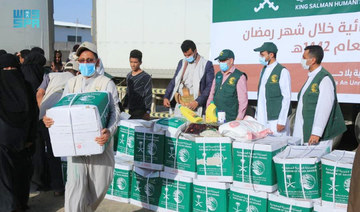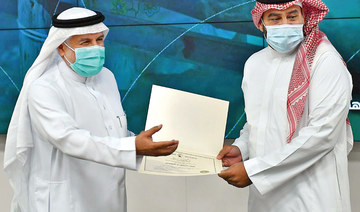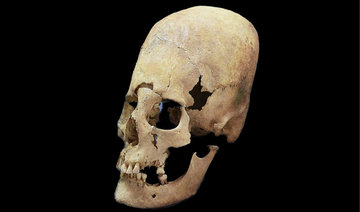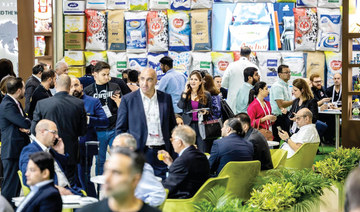RIYADH: Dr. Abdullah Al-Rabeeah, general supervisor of the King Salman Humanitarian Aid and Relief Center (KSrelief), met the Swedish special envoy for Yemen, Peter Semneby, at the headquarters of KSrelief in Riyadh on Sunday.
During the meeting, Al-Rabeeah reviewed the 590 projects that the Kingdom has implemented through KSrelief in Yemen so far.
They discussed matters of common interest related to humanitarian and relief affairs in Yemen, and the efforts made to alleviate the suffering of the Yemeni people.
Semneby praised the pioneering role provided by the Kingdom through KSrelief in support of countries in need, and the special attention given to the Yemeni people.
Meanwhile, KSrelief distributed more than 27 tons of food baskets to displaced families in Yemen’s Marib governorate, benefiting 1,554 individuals. The center also continued distributing Ramadan food baskets to Syrian and Palestinian refugees and Lebanese families in Lebanon.
Saudi aid agency chief meets Swedish envoy for Yemen
https://arab.news/jy5j3
Saudi aid agency chief meets Swedish envoy for Yemen

- KSrelief distributed more than 27 tons of food baskets to displaced families in Yemen’s Marib governorate, benefiting 1,554 individuals
AI set to unlock value in Saudi Arabia’s health sector

- Up to $27bn in economic benefits forecast by 2030
- AI already enhancing patient care, access, say experts
RIYADH: Saudi Arabia’s health-tech sector is undergoing substantial transformation driven by artificial intelligence, promising significant economic and operational benefits.
A McKinsey & Co. analysis forecasts that by 2030 AI could unlock $15 to $27 billion in economic value for the Kingdom’s medical sector.
This can be achieved by automating up to 40 percent of healthcare tasks, enhancing efficiency and reducing manual workload.
Such advancements align with Saudi Arabia’s ambition to emerge as a regional technology hub, with the medical sector being a key division benefiting from this digital transition.
Crown Prince Mohammed bin Salman has highlighted the potential of this revolution, and is quoted as saying: “We are living in a time of scientific innovation, unprecedented technology, and unlimited growth prospects. These new technologies, such as artificial intelligence and the Internet of Things, if used optimally, can spare the world many disadvantages and can bring enormous benefits to the world.”
Time of transformation
In a recent interview with Arab News, Nadine Hachach-Haram, a surgeon and co-founder of the health-tech platform Proximie, shared her observations about the transformative applications of AI. She said this could be used for enhancing patient safety, communication, and service efficiency across Saudi Arabia’s healthcare sector.
“AI use allows the automation of necessary but time-consuming and tedious administrative processes,” Hachach-Haram said. “AI implementation will help minimize errors, optimize efficiency, revolutionize patient care, and improve global healthcare accessibility.”
She also underscored the government’s approach to fostering AI, including initiatives such as the National Data Bank and cloud infrastructure to support public and private sector collaboration.
Hachach-Haram explained that AI and machine learning are revolutionizing patient outcomes and healthcare service efficiency in the Kingdom as the nation embraces these technologies to align with the Saudi Health Sector Transformation Program.
This undertaking is a pivotal element of the Ministry of Health’s strategy under Vision 2030, which aims to enhance medical care access and modernize facilities to ensure the well-being of the populace.
Proximie, a global healthcare platform, is at the forefront of this shift, playing a critical role in the SEHA Virtual Hospital’s efforts to overcome geographical constraints, enhance patient safety, and facilitate the sharing of medical expertise across Saudi Arabia.
Hachach-Haram highlighted the use of AI in a medical setting. “The hospital utilizes AI to triage caseloads and employs the latest imaging technologies to aid in remote scan interpretations.”
This evidence demonstrates tangible benefits, with Proximie instrumental in supporting cardiology surgeries at regional hospitals, thereby minimizing the need for patient referrals and travel, Hachach-Haram said.
“The hospital has the capacity to treat over 400,000 patients a year. It uses AI to triage caseloads and makes the latest imaging technologies available to support the interpretation of scans remotely,” she added.
She shared a poignant illustration of this impact in the case of Noura Saleh, 70, from Tabuk, who required urgent surgery following stroke-induced heart failure.
The operation was successfully executed at a local hospital, with the SEHA Virtual Hospital’s cardiology team providing remote guidance through Proximie.
Hachach-Haram said: “It’s a great example of how distance is no longer an obstacle to receiving the best care promptly.”
Improved access and care
Speaking to Arab News, Rania Kadry, co-founder of the Egyptian health-tech platform Almouneer, shared her prediction of the Kingdom’s transformation over the next decade.
Kadry envisions AI significantly impacting medical diagnostics, treatment planning, and personalized medicine in Saudi Arabia.
“This will lead to improved patient outcomes, reduced healthcare costs, and enhanced efficiency in healthcare delivery,” she said.
She added that AI-driven telemedicine platforms and remote-monitoring systems are expected to become more prevalent, particularly in rural areas, increasing access to healthcare services nationwide.
“Moreover, AI will continue to be integrated into healthcare administration processes, optimizing resource allocation, and improving overall healthcare management,” she added.
Hachach-Haram addressed a crucial aspect of AI in healthcare: patient trust and data privacy. She acknowledges the apprehension many patients feel about the use of their health data. However, she believes that proper communication about the benefits of healthcare innovation and knowledge-sharing might encourage patients to become proactive proponents of AI.
“Many patients are understandably nervous about the use of their sensitive health data, but if the benefits of healthcare innovation and knowledge-sharing are clearly explained, patients may embrace becoming ambassadors about the benefits of using and sharing data — helping the entire ecosystem,” she said.
Furthermore, the integration of AI in healthcare administration is predicted to revolutionize resource allocation and optimize hospital operations.
Kadry added: “One example could be the widespread implementation of AI-powered predictive analytics systems in Saudi Arabian hospitals.” This would leverage patient data to forecast healthcare needs and enhance service delivery, she added.
Kadry also underscored the Kingdom’s commitment to health tech and AI innovation, referencing Saudi Arabia’s ambitious plan to allocate 2.5 percent of its gross domestic product, approximately $16 billion by 2040, to research and development, with a focus on aging and chronic diseases.
“Can you imagine how much the country will progress under the young and progressive leadership?” She highlighted the launch of the Hevolution Foundation, a $20 billion Saudi Arabia initiative dedicated to advancing human health and extending life expectancy globally.
Despite being in its early stages, the utilization of AI technology holds immense potential to positively influence patient outcomes across the Arab world.
UK auction house removes Egyptian skulls from sale after outcry
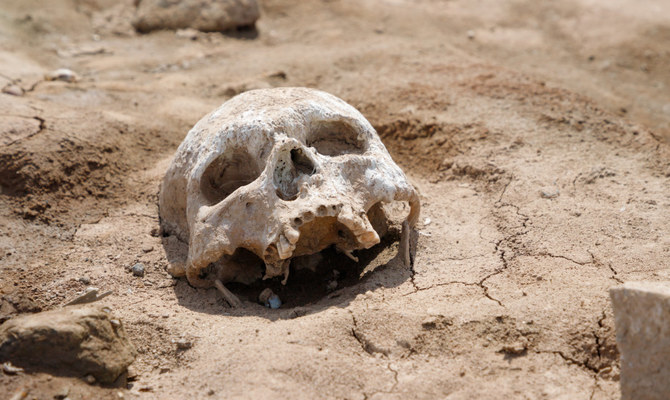
- Lawmaker condemns trade as ‘gross violation of human dignity’
- Items were part of collection owned by English archaeologist Augustus Pitt Rivers
LONDON: A UK auction house has removed 18 ancient Egyptian human skulls from sale amid condemnation by a member of Parliament, The Guardian reported.
Labour MP Bell Ribeiro-Addy said the sale of human remains for any purpose should be outlawed and described the trade as a “gross violation of human dignity.”
Semley Auctioneers in Dorset had listed the skulls with a guide price of £200-£300 ($250-$374) for each lot. The collection included 10 male skulls, five female and three of an uncertain sex.
Some of the skulls were listed as coming from Thebes and dating back to 1550 B.C.
They were originally collected by Augustus Henry Lane Fox Pitt Rivers, an English soldier and archaeologist who established the Pitt Rivers Museum in Oxford, which contains about 22,000 items.
After being housed at a separate private museum on his estate, the skulls were sold as part of a larger collection to his grandson, George Pitt Rivers, who was interned during the Second World War for supporting fascist leader Oswald Mosley.
Ribeiro-Addy said: “This despicable trade perpetuates a dark legacy of exploitation, colonialism and dehumanization. It is a gross violation of human dignity and an affront to the memory of those whose lives were unjustly taken, or whose final resting places were desecrated.
“We cannot allow profit to be made from the exploits of those who often hoped to find evidence for their racist ideology. It is imperative that we take decisive action to end such practices and ensure that the remains of those who were stolen from their homelands are respectfully repatriated.”
Britain has strict guidelines on the storage and treatment of human remains, but their sale is permitted provided they are obtained legally.
Saleroom, an online auction site, removed the skulls from sale after being contacted by The Guardian. Its website states that human remains are prohibited from sale.
A spokesperson said: “These items are legal for sale in the UK and are of archaeological and anthropological interest.
“However, after discussion with the auctioneer we have removed the items while we consider our position and wording of our policy.”
Prof. Dan Hicks, Pitt Rivers Museum’s curator of world archaeology, said: “This sale from a legacy colonial collection that was sold off in the last century shines a light on ethical standards in the art and antiquities market.
“I hope that this will inspire a new national conversation about the legality of selling human remains.”
Some of the skulls in the auction had been marked with phrenological measurements by the original collector, he said.
“The measurements of heads in order to try to define human types or racial type was something that Pitt Rivers was continuing to do with archaeological human remains in order to try to add to his interpretations of the past.”
UK students launch fresh wave of pro-Palestine protests

- Activists plan rallies and encampments on campuses across the country
- They aim to persuade universities to divest from arms companies supplying weapons to Israel
LONDON: Students in the UK are launching a fresh round of demonstrations against the war in Gaza.
The latest protests were expected to begin on Wednesday on the campuses of at least six British universities, including Sheffield, Bristol, Leeds and Newcastle, The Guardian newspaper reported. They come at a time when authorities in the US are violently cracking down on similar demonstrations.
The British students are demanding that their universities divest from arms companies that supply weapons to Israel, and in some cases that they sever all academic ties with Israeli institutions.
In Britain, regular mass public marches in London and other cities have attracted most of the attention surrounding the pro-Palestinian protest movement, with little attention so far paid to demonstrations at universities.
However, recent events in the US, including massive protests at Columbia University in New York, have encouraged student demonstrators in Britain to ramp up their efforts.
A coalition of “staff, students and alumni” at Sheffield and Sheffield Hallam universities have established an encampment in solidarity with the Palestinian people, as part of a group calling itself the Sheffield Campus Coalition for Palestine. This week, students are expected to stage walkouts from lectures and take part in a demonstration in Sheffield.
Similar activities are expected in Newcastle, organized by a group called Newcastle Apartheid off Campus. More than 40 students at the city’s university reportedly have set up an encampment on campus and planned to stage a rally on Wednesday. Organizers said students are protesting against Newcastle University’s partnership with defense firm Leonardo SpA, which produces the laser guidance system for the F-35 jets that have been used by the Israeli military in Gaza.
They added: “Although the student union has passed motions with 95 percent of people in favor of calling for the university to end its ties with Leonardo, and multiple ‘Leonardo off Campus’ protests on its campus, it is clear that the university has not listened to students’ concerns.”
Students in Leeds and Bristol are involved in similar activities, including rallies and encampments.
A spokesperson for Universities UK, which represents 142 academic institutions, said: “Universities are monitoring the latest news on campus protests in the US and Canada.
“As with any high-profile issue, universities work hard to strike the right balance between ensuring the safety of all students and staff, including preventing harassment, and supporting lawful free speech on campus. We continue to meet regularly to discuss the latest position with university leaders.”
Farasan Island celebrates 20th Hareed Fishing Festival

- Event showcases tourist activities such as parasailing, traditional folk dances
RIYADH: Fishermen from the Jazan region have started preparing for the 20th Hareed Fishing Festival, which begins on Thursday.
The festival, which takes place on Farasan Island and lasts for two days, celebrates the fishing of parrotfish, otherwise known as hareed.
It showcases various tourist activities such as parasailing, traditional folk dances, and competitions for catching the fish, which is difficult due to their survival instinct which leads them to hide by corals.
Hareed are traditionally caught close to the shore in nets. The brightly colored fish come in different sizes and change color as they grow, the color varying according to their sex. They are considered parrot-like as they have teeth that they use to scrape food off coral reefs.
The fishing season varies across the region’s waters. In the past, the people of Farasan celebrated the event by visiting newlywed brides wearing traditional dress, while women and children joined in the festivities at her home.
Visitors to the festival will also get the chance to explore the heritage sites in Farasan, which include Wadi Matar, Al-Qassar village and Bait Al-Jarmal, along with several historic houses.
The island boasts a unique cultural heritage which centers on sailing and pearl-diving experiences in the past.
Jazan Gov. Prince Mohammed bin Nasser is launching the festival, which is organized by the region’s branch of the Ministry of Environment, Water and Agriculture, in partnership with the islands’ governorate.
Mohammed Al-Atif, the general director of the branch, said that the festival embodied the customs and traditions of the people of the Farasan Islands and was considered an annual event to highlight the region’s tourism potential.
He added that the festival also celebrates hareed, which appears at the same time each year and proves a major attraction for people in the Jazan region.
Riyadh hosts food technology and innovation show
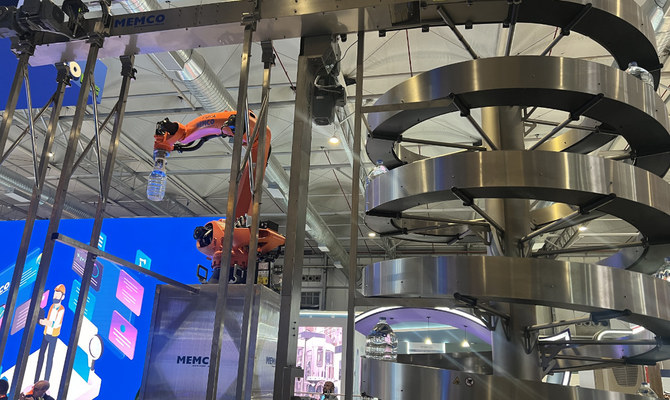
- Industry giants showcase latest in processing, sustainability
RIYADH: More than 400 companies from 35 countries are taking part in the first Saudi Food Manufacturing show, which opened in Riyadh on Tuesday.
Held under the patronage of Saudi Minister of Industry and Mineral Resources Bandar Al-Khorayef, the event focuses on processing, packaging and ingredients and aims to facilitate high level business deals, connections and collaborations.
Three companies that won a Saudi Food Manufacturing Award at the event — Multivac, DC Norris and Brenntag — spoke to Arab News.
Amir Sotoudeh, managing director of Multivac, said the German firm won the Best Processing Innovation Award for its TX series and smart services at Gulfood Manufacturing.
The company has had a branch office in Riyadh since 2009 and the Kingdom is the company’s largest market in the Middle East.
“Saudi Arabia is a significant market, especially in recent years, with major developments focusing on local production and manufacturing. That’s where our technology and expertise as a market leader in processing and packaging are essential.”
DC Norris is a UK-based process equipment company serving 62 countries. It provides solutions for food, dairy and beverage manufacturing and won the Best Processing Manufacturing Award.
Stuart Rigby, product and process technology manager at DC Norris, said the company’s jet cook system, which is used in Saudi Arabia, Qatar, Dubai and Azerbaijan, was able to cook meals two to three times faster than traditional methods.
“It also uses considerably less water, resulting in zero burns, requiring less cleaning and reducing costs. Additionally, it consumes up to 55 percent less energy than traditional cooking methods,” he said.
Brenntag, a 150-year-old German company, is the global market leader in chemical and ingredient distribution. It won the Best Ingredients Innovation Award.
Mahaboob Shaik, technical sales manager at Brenntag, said: “We have replicated the characteristics of regular milk-based proteins and constituents using plant-based alternatives. We’ve developed a Greek-style feta cheese made from plant-based ingredients.
“This helps to reduce allergens like milk proteins in dishes like Caesar salad. Now, when you order a salad at a restaurant, you can enjoy a plant-based cheese, which is entirely vegan.”
Several Saudi manufacturers, including Sapin, Anasia and Memco, are taking part in the show, which provides a platform for companies to exchange ideas.
Majed Al-Argoubi, CEO of the Saudi Authority for Industrial Cities and Technology Zones, said: “The industrial sector is going to increase both the GDP and abilities of youth in the Kingdom.
“We are making impressive growth through Saudi Vision 2030 and Made in Saudi is remarkable for expanding cities across the country and achieving our goals.”
Among the most innovative products on display are the Novamyl BestBite from Novozymes, which improves texture and softness in baked goods while extending shelf life to reduce food waste. Others include sustainable packaging for dates from Napco, a sugar reduction method for fruit juice from Austria Juice, Lactosan, a natural culinary booster from FSL and Biopap, a range of renewable, compostable, high-performance food containers.
Pavilions from Italy, Germany, the Netherlands, US, France, Turkiye and China reflect the international scope of the show, which runs until Thursday.




